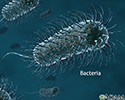Anaerobic bacteria
Anaerobe
Anaerobic bacteria are bacteria that do not live or grow when oxygen is present.
In humans, these bacteria are most commonly found in the gastrointestinal tract. They play a role in conditions such as appendicitis , diverticulitis , and perforation of the bowel .
Appendicitis
Appendicitis is swelling (inflammation) of the appendix. The appendix is a small pouch attached to the large intestine.

Diverticulitis
Diverticula are small, bulging sacs or pouches that form on the inner wall of the intestine. Diverticulitis occurs when these pouches become inflame...

Perforation of the bowel
Perforation is a hole that develops through the wall of a body organ. This problem may occur in the esophagus, stomach, small intestine, large intes...

References
Brook I, Goldstein EJ. Diseases caused by non-spore forming anaerobic bacteria. In: Goldman L, Schafer AI, eds. Goldman's Cecil Medicine . 25th ed. Philadelphia, PA: Elsevier Saunders; 2015:chap 297.
Stedman's Online Medical Dictionary. http://stedmansonline.com/content.aspx?id=mlrA1400000238&termtype=t. Accessed June 1, 2015.
Review Date: 4/30/2015
Reviewed By: Laura J. Martin, MD, MPH, ABIM Board Certified in Internal Medicine and Hospice and Palliative Medicine, Atlanta, GA. Also reviewed by David Zieve, MD, MHA, Isla Ogilvie, PhD, and the A.D.A.M. Editorial team.

